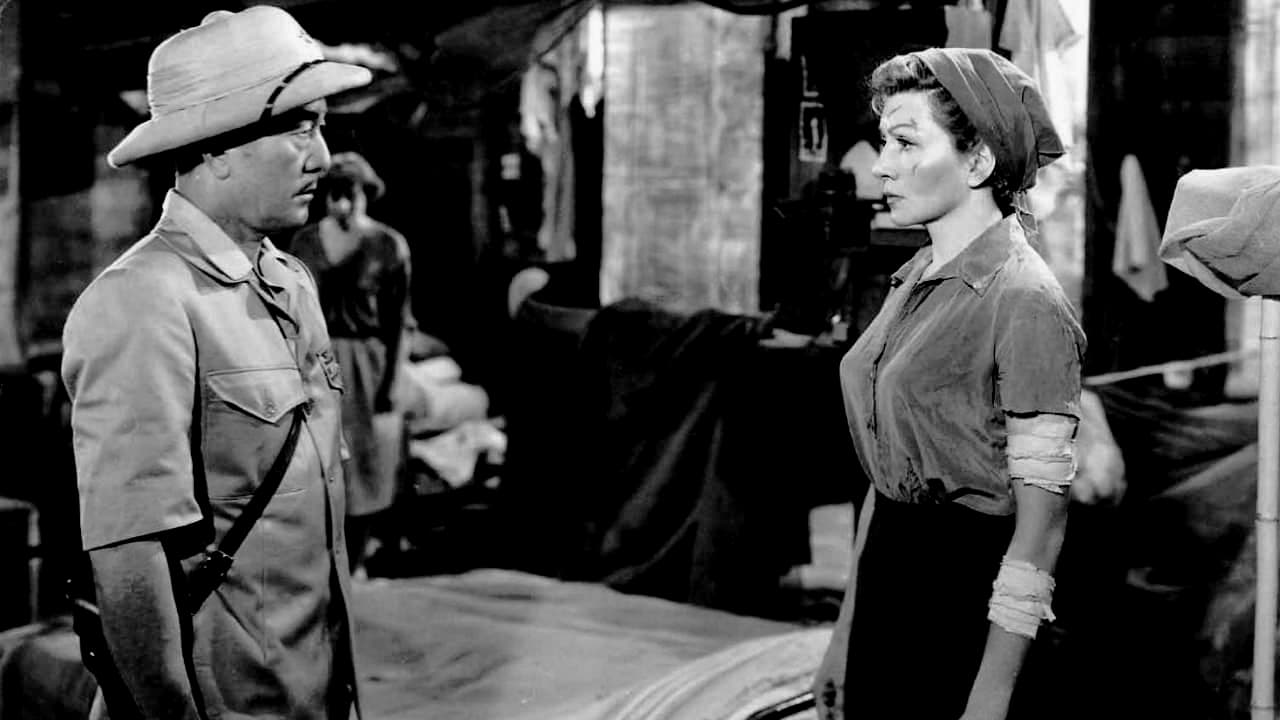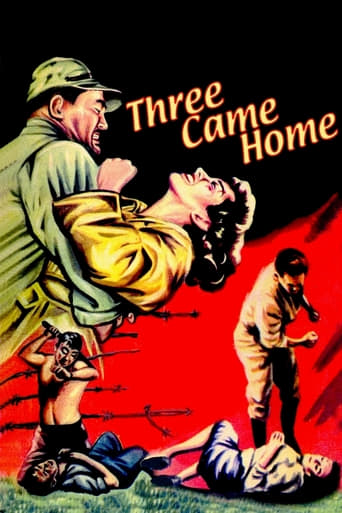

Long before the first Holocause movie or the German prison camp classic "Stalag 13" (or TV's "Hogan's Heroes") came this film documenting the horrors of a Japanese detention camp, actually several, as European residents (and one American) of Borneo are forced out of their homes by the invading Japanese and separated into two camps-one for women and children, the other for husbands. This concentrates mainly on the women's camp, here a real-life survivor who told her own story in book form and soon after saw it adapted for the screen.Claudette Colbert plays Agnes Newton Keith, the courageous woman who stood up to Japanese brutality and almost paid for it with her life. She finds a kinsman of sorts with the camp's very human Japanese commander (Sessue Hayakawa) who admires her for an earlier book she wrote and makes her an occasional confidante. But other Japanese soldiers and guards are obviously envious of this friendship, and make her pay in quite inhuman and degrading ways. The film hits its emotional high when Hayakawa reveals to her the fate of his family who moved from Tokyo to Hiroshima to disastrous results.As great as Colbert is, she never looses her movie star good looks while the other women around her look as if they've been beaten by the life they've been forced into. Colbert's hair style remains impeccable, false eye lashes never slip, and she barely has any dirt on her face even in the most brutal of torture scenes and one where she scoots underneath a fence to meet her husband (Patric Knowles) for just one minute. It is Hayakawa who garners the highest praise, especially in climactic scene where he grieves for his family while giving several American children (including Colbert's son) an impromptu party just before the end of the war. No matter what your feeling towards the Japanese as far as World War II is concerned, you can't help but be touched by his breakdown, especially in light of his kindness to Colbert.The gripping scene between Colbert and Knowles where she risks everything to see him for one minute is another touching scene, as prison guards arrive at the women's bunk house to check on Colbert's son, desperately in need of Quinine. That and other tense scenes will have you on the edge of your seat.
... View More*Spoiler/plot- 1950, The experiences of three women in WW2 inside a Japanese prison camp in Borneo, the true story experiences of Agnes Newton Keith. *Special Stars- Claudette Colbert, Patric Knowles, Sessue Hayakawa. Writer: Nunnaly Johnson.*Theme- Optimism is contagious and will conquer all. *Trivia/location/goofs- From the famous bestseller book; the story experiences of Agnes Newton Keith. *Emotion- An enjoyable and dramatic film of the wartime experiences between: the conquerors and conquered, Asian and European cultures, military and civilian, male and female, and more such.
... View MoreThis is the fourth and last of the heart-wrenching Claudette Colbert World War II films, the previous being SO PROUDLY WE HAIL! (1943), SINCE YOU WENT AWAY (1944) and TOMORROW IS FOREVER (1946) in which she played, respectively a brave Army nurse, a struggling home-front wife and mother and a WW I widow who passionately tries to keep her only son from participating in WW II. In THREE CAME HOME she plays Agnes Keith, an American author married to a British colonial officer (Patrick Knowles) living in Borneo. When the Japanese invade the island they imprison the American and British residents. The Keiths are interned in separate jungle camps one for women and children and another for men for three and a half grueling years. It is true that at times Colbert doesn't quite look like a prison camp starveling but in those days movies did not offer the sort of hyperrealism we've grown accustomed to since the 60's, but she certainly does not look like she stepped out of a beauty salon. In fact I can think of no other film in which she appeared more plain and unvarnished. Few if any actresses of her stature in that era would have taken on the physical demands of this role. Unfortunately it was also her final socko performance on film. None of her 50's work came close to her substantial work here and she was all but wasted in PARRISH (1961). But here both she and Sessue Hayakawa as the prison camp commander deliver true and memorable performances as mortal enemies whose mutual interest in literature and shared experience of parenthood create a tenuous bond that augments the suspense and dramatic impact of the story.Based on a memoir by the real-life Mrs. Keith (who was quite a character in her own right, and not remotely like Colbert), there is a vein of intelligence running through the proceedings, lifting them out of the mainstream of the often jingoistic wartime prison film genre. The Japanese are depicted in a dignified and fair manner without being whitewashed; in fact, in an early scene Hayakawa praises Mrs. Keith for the balanced views in her book about the Orient which he had read before the war. It is precisely his respect for her broadminded attitude that probably saved her life. Nunnally Johnson's script is tight and focused, as is the whole enterprise. The emphasis is on human relationships, so that by the end we are swept up in the emotional life of the characters. A bright note is the casting of a winning boy actor named Mark Keuning who has to be one of the best and most believable child actors ever. He appeared in only two movies, both in 1950, before retreating permanently from films.This is a film worth seeing again and again. It has lost none of its essential power over the decades. Other films are grittier, with more blood and pus and exaggerated savagery, more breathtaking location shooting and exotic cultural immersion, but few can pack the kind of punch this one does. The ending is one of the most moving you will ever see.
... View MoreAgnes Newton Keith's memoir about prisoners-of-war during WWII becomes emotional, if somewhat overly-familiar saga starring Claudette Colbert as a female writer who, along with her young son, is taken from Borneo into a prison camp run by the Japanese in 1942. Director Jean Negulesco always worked exceptionally well with actresses, and Colbert excels here in a meaty role. The horrors and insanity of the war are vividly-captured, though the Japanese seem to be a formidable, yet one-dimensional nemeses (to the point that one wonders why it took so long to overtake them and win out this story). There are much better POW dramas from this era, however "Three Came Home" is a fairly good one, with gripping and heartfelt passages. **1/2 from ****
... View More